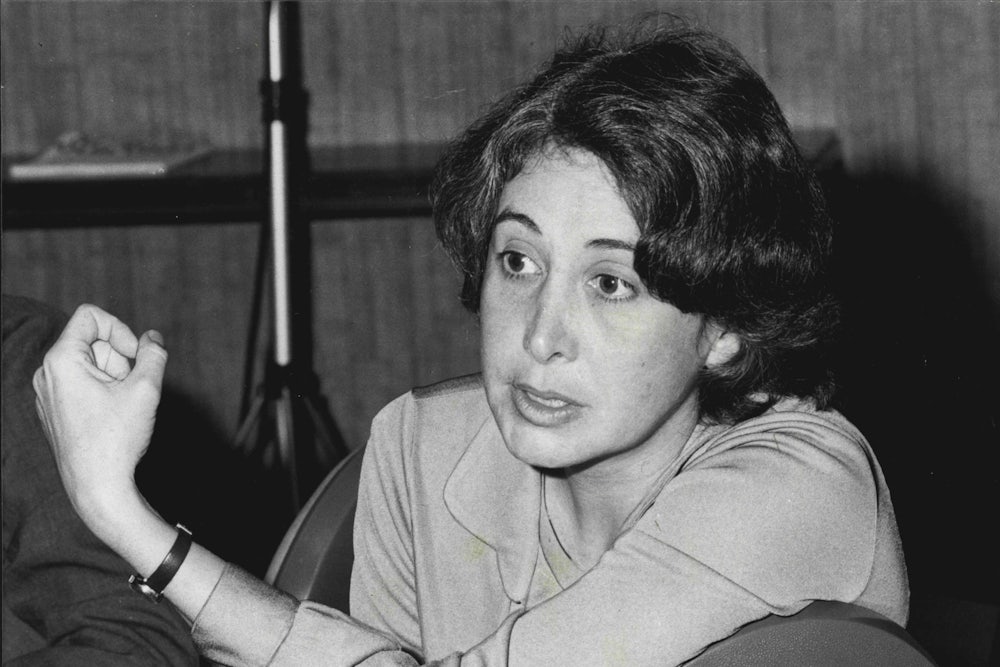Last Saturday, after a long illness, the radical feminist Susan Brownmiller died at 90. She leaves behind a few distant cousins, loving friends, and a public conversation about sex and gender that was transformed by her journalism, books, activism, and media presence. The author of seven books, Brownmiller is best known for Against Our Will: Men, Women, and Rape, still in print 50 years after its 1975 publication. This surprise bestseller came on the heels of a boomlet in radical feminist theory, criticism, and fiction marketed to a commercial audience.
Brownmiller was, hands down, one of the savviest feminist media figures of the twentieth century. The architect of a savage takedown of Playboy mogul Hugh Hefner that aired on the March 26, 1970, episode of The Dick Cavett Show, she was a star in a movement that deplored self-appointed leaders or spokespeople.
Accounts of Susan Brownmiller’s life, as they have emerged in the press and in popular culture, rightly note the controversial stances she took over the course of her life in feminism. But perceiving Brownmiller as singular in this regard misses important context. Radical feminists were inherently controversial, not only because they promoted a gender revolution but because their insights emerged from intimate conversation, conflict, and arguments. Clashes over ideas and personal styles were also consistent with the radical political movements that Brownmiller and her sisters were forged in before feminism: Communist and Communist-adjacent groups, Fair Play for Cuba, anti-nuclear politics, the Civil Rights Movement, and the mobilization to end the war in Vietnam.
Although she did not anticipate, or accept, some of the criticisms that would be aimed at her, Brownmiller also knew that the claims about male power that structured Against Our Will would be broadly controversial. Its project was to create a national debate about sexual assault based on facts that already existed, a debate that had not yet happened outside radical feminist circles. By recasting rape as a political act, Brownmiller asked her readers to rethink everything they thought they knew: Western civilization, their own attitudes, the law, and social science—among other things.
In the introduction, Brownmiller also foregrounded the radical feminist principle that talking and listening can change minds. She, for example, had not believed that rape was a feminist issue. Yet other women “understood their victimization,” she wrote. “I understood only that it had not happened to me—and resisted the idea that it could. I learned that in ways I preferred to deny the threat of rape had profoundly affected my life.” From conflict came transformation, and the idea for the book that commercial editors had been soliciting from her since Brownmiller’s 1970 insider account of the women’s movement in The New York Times Magazine.
Against Our Will was widely praised but also had its detractors. Black feminist intellectuals such as bell hooks and Angela Davis pointed out that Brownmiller’s attempts to weave the crime of lynching into her theory of gender and power were clumsy and confounded history. For example, Black men were historically controlled not by the fear of rape but by the fear of being put to death by a false rape charge, a fact that Brownmiller acknowledged but then displaced in a tortuous section on the Emmett Till lynching.
It isn’t true, however, that only Black feminists thought Against Our Will was flawed. Some male, and a few female, reviewers were outraged by Brownmiller’s conclusion that the patriarchy was promoted and preserved by the ever-present possibility of sexual assault. Some radical feminists who had always been uncomfortable with Brownmiller’s high media profile deplored her use of ideas developed in consciousness-raising sessions, and challenged her to take her name off the book.
Brownmiller’s theory that the patriarchy is propped up by the possibility of sexual assault, as well as positions she took later—her fight to push sex workers and the adult entertainment industry out of Times Square; her assertion that Hedda Nussbaum, a battered woman and the subject of Brownmiller’s 1987 novel, Waverly Place, was not an innocent victim; and most recently, her skepticism about the #MeToo movement—remain controversial, particularly among younger feminists who are fighting these fights in their own way.
But what is often missed in accounts of Susan Brownmiller’s life is that, in addition to her deep commitment to social justice, she was a fundamentally generous, good person with a terrific sense of humor. She loved dogs, the theater, movies, poker, and baseball. When she became prosperous, she put money back into political causes she cared about and took her friends on international trips.
Brownmiller was profoundly loyal to, and generous with, those friends. Her archived correspondence is full of instances in which she connected other women with agents and editors, encouraged them to write books, and boosted their self-confidence. When she worked for ABC in the 1960s, assigned to the Washington bureau over one weekend, she asked the female assistant tasked with orienting her: “Why aren’t you in charge?” This woman quit her job, went on to her own career as a journalist, and became a lifelong friend.
For the last 25 years, Susan Brownmiller played that role for numerous researchers too. In 2009, long before I imagined the biography of her that I am now writing, I went to interview Brownmiller. Nervously stepping off the elevator, I saw the woman on the back of the book I read back in 1975, draped against her door jamb. “Welcome to Jane Street,” she greeted me, flashing a warm smile designed to put me at ease.
By the end of the afternoon, I had not only a terrific interview but a fistful of appointments with other veterans of a political movement who are justifiably wary about how they will be represented. “Her name is Claire Potter,” Susan would say, waving a lit (or sometimes unlit) cigarette with one hand and holding the phone in the other. “She’s a feminist—the real deal. Talk to her.” She would then thrust the receiver at me, and I would make another appointment.
It was, to paraphrase a classic film, the beginning of a beautiful friendship.
I was not Brownmiller’s best friend, or her most daily friend, or the person who helped her the most in her final years. I’m the biographer. But as a feminist who will be in dialogue with her until my book is done and a new generation can argue with her, I will nevertheless miss the living, breathing Susan Brownmiller terribly.






